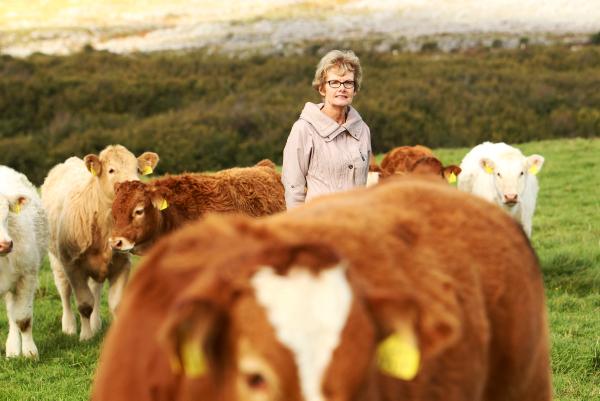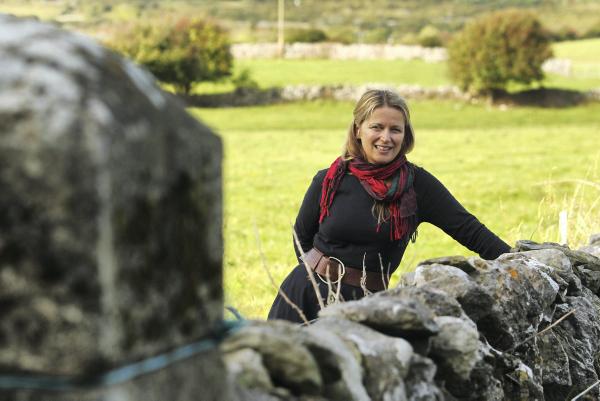Maybe in 20 years’ time, people will say: ‘How did she ever walk up there?’ But it’s therapy to me. I love it.”
Trudging up to 10km every other day in winter to check on cattle grazing the limestone uplands of the Burren might seem like hardship to some, but suckler farmer Philomena Hynes takes it in her stride.
Since marrying into the farm in Deelin, Co Clare, 44 years ago, she has practised the ancient tradition of “winterage”, and despite the loss of her husband Michael seven years ago, the sprightly mother-of-four keeps it up. This year she moved 31 cows upland from early October, where they will remain until the first of the springers start to calve in January.
But Philomena is just one of approximately 1,000 farmers in the Burren practicing upland winter grazing, a tradition celebrated this weekend with the Burren Winterage Festival.
Co-ordinating proceedings is Brigid Barry of Burren Beo Trust. Raised on a beef farm near Bandon, Brigid’s previous roles have ranged from working as assistant to fashion muse Isabella Blow at The Sunday Times to spending 10 years studying primates and the bush meat trade in locations ranging from Africa to the Amazon.
But to Brigid, farming in the Burren is just as fascinating.
“Everywhere I’ve worked, it’s always been about the people and the place, and you can’t have the Burren without its people,” she says. “It’s a very fragile landscape and it depends on the people being here and managing it.”
Burren Beo runs up to 40 programmes, from heritage walks and talks to primary school projects, but the Winterage Weekend is one of its biggest events, attracting 3,000 people last year.
Highlights include a “Sharing at Samhain” community feast, Burren Winterage school, guided walks and food fair. But the highlight of the festival is this Sunday, when the public will join two local farmers as they drive their cattle up Gortaclare, near Bellharbour.
“We had 350 people attend the walk last year, but we are estimating 600 this year,” says Brigid, who explains that the festival has also caught international imagination, with photographer Morgan O’Donovan, who shoots for Vogue, previously travelling to capture it.
“This is an amazing thing that’s going on and we should be proud, as a nation, that it’s going on here.”
Brigid explains that, historically, Burren cattle were seen as strong and healthy thanks to living outdoors year-round on the dry limestone landscape, free to munch on the region’s rich flora and fauna. (Indeed, Philomena Hynes says she does not have to inject her herd for fluke and that in 44 years, she has only ever lost two cattle on the mountain.)
What many people might not realise, however, is just how important winterage is for the local environment.
Caitriona Maher is a consultant ecologist on the Burren Farming For Conservation programme, the follow-up to the Burren LIFE scheme that was developed by partners, including IFA and Teagasc, to build a model for sustainable agriculture in the region.
At present, 160 farmers are part of the programme, with a 50% increase projected under the next Rural Development Plan. Payments up to a maximum of €120 per hectare are made to farmers who farm the uplands in a favourable way for species-rich grassland, with grant aid also available for measures such as scrub removal, water installation and wall repair. Scientists have also developed a special Burren ration to meet any additional nutritional needs of the cattle during winterage.
Caitríona is passionate about the Burren as a biodiversity hotspot, with over 800 plants recorded there (she jokes it provides the cattle with their perfect equivalent of fruit and veg).
While most people might assume that winter grazing would be detrimental, the herds actually clear off the strong grasses that would otherwise take over the landscape.
“This means that once the cattle come down in spring, the uplands can flower freely.
“If you go up there in May or June, you wouldn’t know it was a farmed landscape – it’s like a garden,” says Caitriona, who explains that flowers range from the spring gentian – normally found in the Alps – to the hoary rock-rose of the Mediterranean.
But for Burren farmers like Philomena, it’s very simple – winterage is a way of life.
“The day I won’t be able to do it ... I hate to think of being stuck in the house,” she laughs. “There’s only so much cleaning you can do.”
The Burren Winterage Weekend, supported by FBD Trust, takes place 24-26 October, with the Winterage cattle drive meeting at the GAA pitch, Turlough, at 11.45am on Sunday, followed by soup and sandwiches at Daly’s Pub, Bellharbour. Admission costs €5. For more information on the event, call 091-638-096 or visit www.burrenwinterage.com CL






 This is a subscriber-only article
This is a subscriber-only article







SHARING OPTIONS: